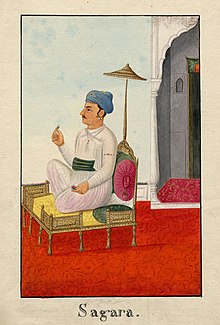Spouse(s) Sumati, Bhadra, Amba | Children Asamanja | |
 | ||
Similar Dasharatha, Jamadagni, Bharata, Sumitra, Sampati | ||
How ganga came down from heaven to earth part 1 of 2
In Hindu mythology, Sagara (Sanskrit: सगर; IAST: Sagara) is a prominent king of the Suryavansha dynasty in Satya Yuga. He has two wives, one a princess of the Vidarbha, and the other from royal lineage of Sivi, and is an ancestor to Bhagiratha, Dasharatha and Rama.
Contents
- How ganga came down from heaven to earth part 1 of 2
- Yaar mod do by the king sagar
- Birth of Ganga
- Jain Tradition
- References
Yaar mod do by the king sagar
Birth of Ganga
King Sagara performed a horse sacrifice (Ashwamedha yajna) to prove his supremacy. Lord Indra, the leader of the demigods, became fearful over the results of the yajna, so he decided to steal the horse. He left the horse at the ashram of Kapila, who was in deep meditation. King Sagar’s 60,000 sons, (born of Queen Sumati, and his son Asamanja (born of Queen Amba) were then sent to find the horse. When the 60,000 sons found the horse at Kapiladeva’s ashram, they thought he had stolen it. When they prepared to attack the meditating rishi (sage), Kapila opened his eyes. Because the sons of King Sagara had disrespected such a great personality, consequently, fire emanated from their own bodies, and they were immediately burned to ashes.
Jain Tradition
In Jain tradition, Sagara was younger brother of Lord Ajitanatha (second Tirthankara). He was born to Kshatriya King Sumitra and Queen Vijayanti (Yasomati) of Ikshvaku dynasty in Ayodhya. He was the second Chakravartin ruler of the present half time cycle (Avasarpini) of Jain cosmology who conquered the world with his seven jewels. His queens were Sumati and Bhadra. He had sixty-thousand sons from his queens, Janhu being the eldest. Janhu flooded the Naga Kingdom with waters of river Ganga. This infuriated the Naga King who burnt all the sons of Sagara in anger. Sagara then place Bhagiratha, his grandson, on throne and left for penance.
